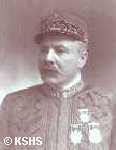|
|
|
|
|
|
|
|
|
| Title | U.S. Field Artillery March, The | |||
|---|---|---|---|---|
| Composer | Sousa, John Philip | Marshall’s Civic Band Topeka, KS Est’d 1884 |
Number | M-126 |
| Type | CB | |||
| Date | 1918 | |||
| Key | Ab | |||
| Arranger | Lake, Mayhew Lester |  |
Length | 0.00 |
| Publisher | Carl Fischer | Vocal | No | |
| Association | Military: Army | Grade/Difficulty | ?/? | |
| Last Performed | Unknown | |||
| Manuscript | No | |||
| Style | March | Location | ||
| Cataloger | Alan Ukena | |||
| Date Cataloged | 06/30/1993 | |||
| Notes |
Composed in 1917. "During Sousa's brief wartime service in the navy, he was
invited to a luncheon meeting in New York with Secretary of the Navy Josephus
Daniels and Army Lieutenant George Friedlander. Friedlander, of the 306th Field
Artillery, asked Sousa to compose a march for that regiment, suggesting that the
march be built around an artillery song then known by such names as 'The Caisson
Song,' 'The Caissons Go Rolling Along,' and 'The Field Artillery Song.' The song
was believed to be quite old, perhaps of Civil War origin, and had not been
published; the composer was believed dead.
"Sousa liked the song and agreed to use it. He set it in a different key,
changed the harmonic structure, refined the melody, gave it a more snappy
rhythm, and added this to his own original material. The complete composition
was then published as the 'U.S. Field Artillery' march.
"Sousa's touch added the spark necessary to transform the little-known
artillery song into the army's most popular melody. The new march was eagerly
adopted by the army's artillery units and later by the army as a whole....
"It came as quite a surprise to Sousa and Lieutenant Friedlander to learn that
the composer of 'The Caisson Song' was still very much alive and that the song
was less than ten years old. It had been written in March, 1908, by Lieutenant
Edmund L. Gruber of the U.S. Army Field Artillery at Camp Stotsenburg,
Philippine Islands. The piece was composed in the presence of at least two
fellow officers who assisted in writing the lyrics. No doubt Lieutenant Gruber
was even more surprised to find that his song, much revised, had skyrocketed to
fame. He raised no objections to Sousa's use of the song, which was serving the
army's purpose so admirably.
"Gruber's song had a peculiar history after the Sousa march was published.
Sousa's treatment of the melody had made it so attractive to several publishers
that they fought over it. Shortly after the publication of the 'U.S. Field
Artillery' march, the melody found its way into several song collections and
became exceptionally popular during the 1920's. It is not known whether or not
Gruber gave written permission for the use of his song in any of these
publications, but he did permit its incorporation into a volume of West Point
songs in 1921.
"The melody became even more popular when the Hoover Vacuum Cleaner Company
adopted it as its sales song. The company added its own words and used it in
radio advertising. Unaware of the song's origin, a Hoover salesman called on
Mrs. Gruber in 1929 and attempted to sell her a sweeper. Mrs. Gruber informed
him of the origin of Hoover's sales song and suggested that this entitled her to
a sweeper, gratis. She received one, and her husband endorsed Hoover sweepers.
This did not please certain artillery officers, who later asked Hoover to
refrain from the use of what they considered their own exclusive song.
"When Gruber's personal application for a copyright of the song was denied
in 1930, he gave up hope of ever claiming royalties. However, in 1942 the
sponsors of the West Point publication reestablished their claim and brought
suit against the E.C. Schirmer Company, another of the song's pubishers. The
court ruled that the melody had in effect been dedicated to public use and that
its widespread use for over thirty years with no substantial objection by the
composer constituted a practical abandonment by the composer. This judgment was
upheld in an appeal the following year.
"Gruber rose to the rank of brigadier general and died in active service in
1941. He had composed over a hundred songs for his own enjoyment and had not
expected any of them to reach Tin Pan Alley. But the one paraphrased by John
Philip Sousa achieved a popularity beyond his wildest dreams. It glorified the
U.S. Army Field Artillery, so it mattered little to him that many users of his
melody made money while he received nothing. The time-honored manuscript of his
original song now hangs in the library of the U.S. Army Artillery and Missile
School at Fort Sill, Oklahoma."
The Works of John Philip Sousa
pgs. 93-94
Paul E. Bierley
Integrity Press
1984
|
|||
|
MCB Home |
Concerts |
Library |
What's New |
History |
Contact Us |
FAQs |
Site Search
© 2002-2025, Marshall's Civic Band, Inc. |